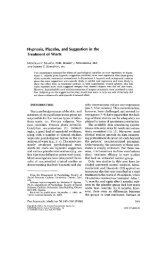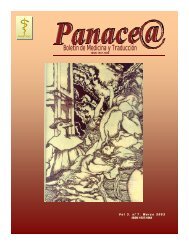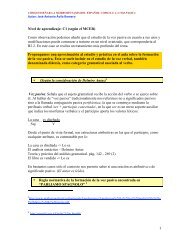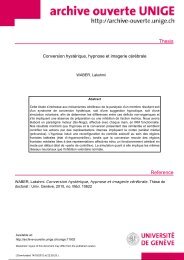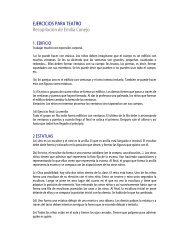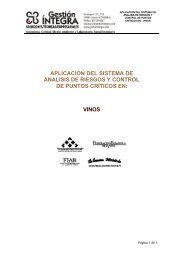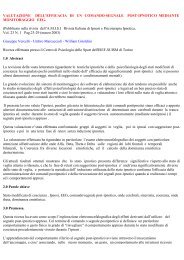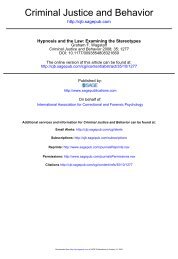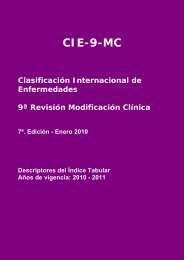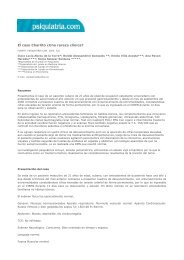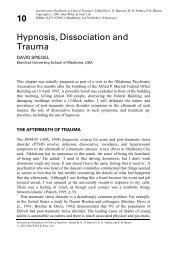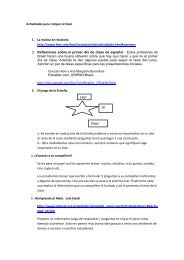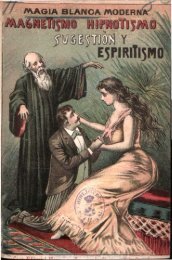Orne, M.T. The use and misuse of hypnosis in court. International ...
Orne, M.T. The use and misuse of hypnosis in court. International ...
Orne, M.T. The use and misuse of hypnosis in court. International ...
Create successful ePaper yourself
Turn your PDF publications into a flip-book with our unique Google optimized e-Paper software.
<strong>Orne</strong> 1979 IJCEHhttp://www.sas.upenn.edu/psych/history/orne/orneijceh19794311341.html17 de 23 19/03/2012 17:24334 MARTIN T. ORNEShe was struck by the peculiarity <strong>of</strong> the h<strong>and</strong>writ<strong>in</strong>g <strong>in</strong> the threaten<strong>in</strong>g notes, <strong>and</strong> for the first timesubmitted these to a h<strong>and</strong>writ<strong>in</strong>g expert who identified the writ<strong>in</strong>g as that <strong>of</strong> the woman who had filed thecharges. When the alleged victim was confronted with this fact, she confessed that there had never beenan attempted assault, that she had never met the two men whom she had acc<strong>use</strong>d, <strong>and</strong> that she hadgenerated the compla<strong>in</strong>t <strong>and</strong> the threaten<strong>in</strong>g notes <strong>in</strong> an effort to reawaken the <strong>in</strong>terest <strong>of</strong> her husb<strong>and</strong>who was <strong>in</strong> the process <strong>of</strong> fil<strong>in</strong>g divorce proceed<strong>in</strong>gs aga<strong>in</strong>st her.<strong>The</strong> appall<strong>in</strong>g aspect <strong>of</strong> this case is that it was the hypnotic session which <strong>in</strong>itially prompted the districtattorney to cast doubt aside <strong>and</strong> proceed with the prosecution. <strong>The</strong> hypnotically enhanced memorieswould have been the basis for the victim's testimony <strong>and</strong> might well have led to the conviction <strong>of</strong> two<strong>in</strong>nocent <strong>in</strong>dividuals who happened to have been <strong>in</strong> the collection <strong>of</strong> photographs available to the police<strong>and</strong> did not happen to have excellent alibis. It was only when the district attorney became aware that thedefense would have appropriate expert help to challenge the totally <strong>in</strong>appropriate way <strong>in</strong> which <strong>hypnosis</strong>was employed <strong>in</strong> this case that a more careful review <strong>of</strong> the evidence uncovered the true state <strong>of</strong> affairs.Far from be<strong>in</strong>g helpful to the prosecution, the manner <strong>in</strong> which <strong>hypnosis</strong> was employed actually served toconf<strong>use</strong> the authorities.THE ROLE OF THE EXPERT IN FORENSIC HYPNOSISIt is not possible <strong>in</strong> the context <strong>of</strong> a s<strong>in</strong>gle article to more than touch upon the complex issues <strong>in</strong>volved <strong>in</strong>the forensic <strong>use</strong> <strong>of</strong> <strong>hypnosis</strong>. However, it behooves those <strong>of</strong> us experienced <strong>in</strong> the cl<strong>in</strong>ical <strong>use</strong> <strong>of</strong> <strong>hypnosis</strong>to <strong>use</strong> extreme care when we <strong>use</strong> our skills <strong>in</strong> a forensic context. We should keep <strong>in</strong> m<strong>in</strong>d thatpsychologists <strong>and</strong> psychiatrists are not particularly adept at recogniz<strong>in</strong>g deception. We generally arrangethe social context <strong>of</strong> treatment so that it is not <strong>in</strong> the patient's <strong>in</strong>terest to lie to us, <strong>and</strong> we appropriately donot concern ourselves with this issue s<strong>in</strong>ce <strong>in</strong> most therapeutic contexts it is helpful for the therapist to seethe world through the patient's eyes <strong>in</strong> order to ultimately help him to view it more realistically.8As a rule, the average hotel credit manager is considerably more adept at recogniz<strong>in</strong>g deception than weare. Not only does his livelihood depend upon limit<strong>in</strong>g errors <strong>of</strong> judgment, but he is <strong>in</strong> a position to obta<strong>in</strong>feedback concern<strong>in</strong>g those errors <strong>of</strong> judgment, whereas <strong>in</strong> most treatment contexts the therapist is neitheraffected by be<strong>in</strong>g deceived nor even likely to learn about the fact that he had been deceived at a later8 See L<strong>in</strong>dner (1955) for a superb description <strong>of</strong> the k<strong>in</strong>d <strong>of</strong> countertransference which leads to theuncritical acceptance <strong>of</strong> the patient's views that, on the one h<strong>and</strong>, makes treatment possible, but on theother can be a source <strong>of</strong> serious difficulties.335 USE AND MISUSE OF HYPNOSIS IN COURTdate. While military psychiatrists <strong>and</strong> other health pr<strong>of</strong>essionals who are required to make dispositionaljudgments on a daily basis do become adept at recogniz<strong>in</strong>g manipulation <strong>and</strong> deception, only a fewcolleagues who are experienced <strong>in</strong> the <strong>use</strong> <strong>of</strong> <strong>hypnosis</strong> have had this type <strong>of</strong> background. Consequently,they have little experience or concern about be<strong>in</strong>g deceived or <strong>use</strong>d. On the other h<strong>and</strong>, a defendant <strong>in</strong> amurder trial or, for that matter, a witness or a victim <strong>in</strong> a crime <strong>of</strong> violence may well have an axe to gr<strong>in</strong>d,<strong>and</strong> it is essential that we recognize that <strong>in</strong> a forensic context the unwary expert witness may become apawn either for the prosecution or for the defense. With the <strong>in</strong>creas<strong>in</strong>g popularity <strong>of</strong> <strong>hypnosis</strong> <strong>in</strong> the<strong>court</strong>s, it is essential that those <strong>of</strong> us who have an <strong>in</strong>terest <strong>in</strong> these matters develop the necessarysophistication <strong>and</strong> judgment <strong>in</strong> the forensic context, much as we have had to acquire it <strong>in</strong> the therapeuticcontext. It would be foolhardy <strong>in</strong>deed to assume that familiarity with one context is sufficient to allow usto function effectively <strong>in</strong> the other. On the contrary, the ground rules govern<strong>in</strong>g the two situations are



